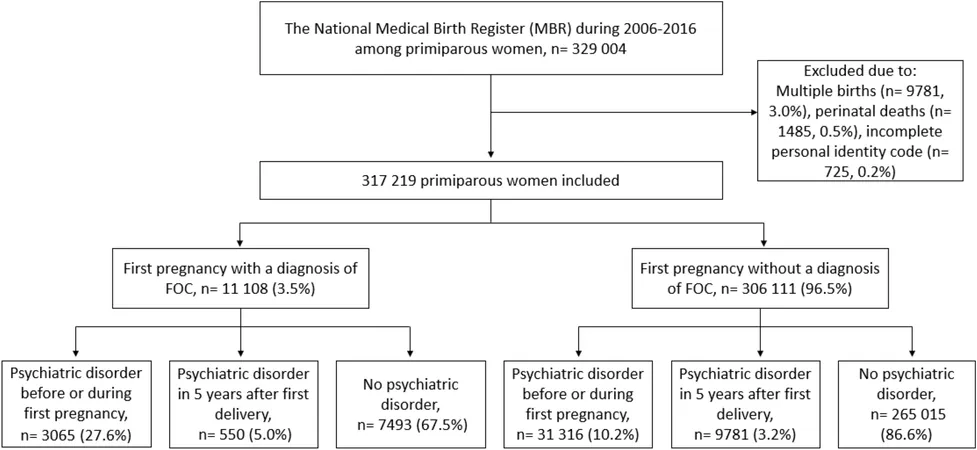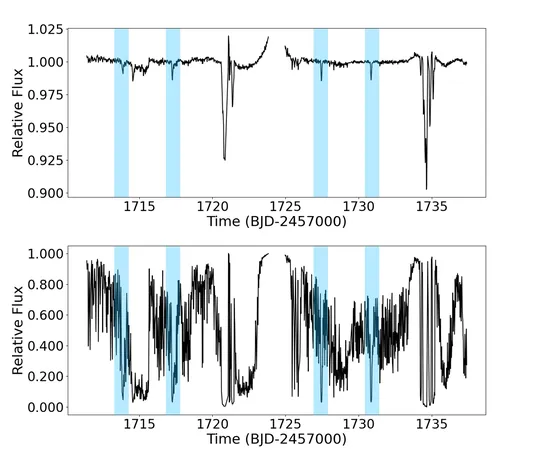
Childbirth Anxiety and Mental Health Issues: A Hidden Barrier to Expanding Families?
2025-01-22
Author: Arjun
Introduction
In recent years, Finland, much like other developed nations, has seen a decline in birth rates. Researchers have finally turned their attention to two crucial factors: fear of childbirth (FOC) and psychiatric disorders. This comprehensive study aims to uncover how these issues influence the likelihood of women having a second child after experiencing their first birth.
Research Methodology
The investigation tapped into a wealth of data from Finland's Medical Birth Register, Hospital Discharge Register, and census information from Statistics Finland. A rigorous statistical approach was employed, utilizing t-tests for continuous variables and chi-square tests for categorical variables. The researchers also calculated hazard ratios (HRs) using Cox regression analysis to illustrate the risks associated with FOC and psychiatric conditions when it comes to having a second child.
Key Findings
From nearly 320,000 women who had their first child between 2006 and 2016, a staggering 68.3% went on to have a second child. However, those diagnosed with fear of childbirth (3.5%) or psychiatric disorders (10.8%) during or before their first pregnancy faced significant barriers. The results were telling:
Only 47.5% of women with FOC had a second child.
Comparatively, 56.8% of women with mental health issues before or during their first pregnancy and just 53.4% with a new psychiatric diagnosis after their first birth achieved similar results.
In contrast, a compelling 70.2% of women without these issues successfully attempted a second birth.
Women suffering from FOC had a 22% reduced chance of having a second child, while psychiatric disorders lowered this likelihood by a staggering 51%.
Broader Implications
This study isn't just numbers; it speaks to the growing concerns around maternal mental health and its far-reaching effects. According to the Family Barometer (2022), nearly 27% of mothers expressed that their anxiety around childbirth delayed their decisions to expand their families. The research indicating that FOC ranges from 2.5% to 8% among first-time mothers is alarming, especially considering the potential long-term consequences on women's health if these issues remain unaddressed.
Moreover, the increasing use of caesarean sections (CS) further complicates the situation. The study found that women who underwent CS—particularly those influenced by FOC or psychiatric conditions—were less likely to have additional children compared to those who had vaginal births.
An Interconnected Web of Issues
FOC and psychiatric disorders appear to be intertwined, with both contributing to negative pregnancy outcomes and emotional distress. Women with FOC often report a worse childbirth experience, a factor that could circle back to influence their family planning choices. The data suggests that comprehensive healthcare approaches, including mental health treatment for anxiety and stress associated with childbirth, may be vital in addressing these challenges.
Conclusion
As Finland's birth rates continue to decline, understanding the underlying factors influencing family planning becomes increasingly critical. The findings underscore the importance of recognizing and treating fear of childbirth and psychiatric disorders not just as medical issues, but as pivotal components of maternal health that can significantly impact the future of families.
Final Thoughts
Given the prevalence of psychological distress among many expecting mothers, there is an urgent need for healthcare systems to bolster support services. Such actions could allow women the opportunity to overcome barriers and feel empowered to expand their families. The study invites further research into holistic treatment options for FOC and psychiatric disorders, emphasizing that mental health support during pregnancy could be key in mitigating these challenges and ultimately boosting the nation’s birth rate.



 Brasil (PT)
Brasil (PT)
 Canada (EN)
Canada (EN)
 Chile (ES)
Chile (ES)
 Česko (CS)
Česko (CS)
 대한민국 (KO)
대한민국 (KO)
 España (ES)
España (ES)
 France (FR)
France (FR)
 Hong Kong (EN)
Hong Kong (EN)
 Italia (IT)
Italia (IT)
 日本 (JA)
日本 (JA)
 Magyarország (HU)
Magyarország (HU)
 Norge (NO)
Norge (NO)
 Polska (PL)
Polska (PL)
 Schweiz (DE)
Schweiz (DE)
 Singapore (EN)
Singapore (EN)
 Sverige (SV)
Sverige (SV)
 Suomi (FI)
Suomi (FI)
 Türkiye (TR)
Türkiye (TR)
 الإمارات العربية المتحدة (AR)
الإمارات العربية المتحدة (AR)